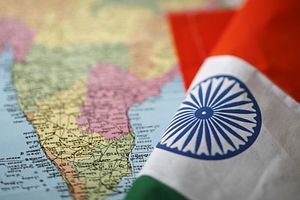With India’s national elections about to kick off on April 7, politics dominates the media and private conversations alike. Most of the conversation focuses on the poll horse race, at this point heavily favoring the opposition Bharatiya Janata Party (BJP) to win more than 200 of the 543 seats in the lower house of Parliament and form a coalition government. (Click here to learn three things to know about the upcoming elections).
Foreign policy, however, has been largely invisible throughout this campaign cycle, except for the contributions of the two main regional parties in Tamil Nadu, which have a long-standing and special focus on Sri Lanka. Of the two main national parties, only Congress has released its official manifesto so far, putting its foreign policy platform on view for all. (The BJP appears to be in an internal squabble about its manifesto, which was slated for an April 3 release but now may not come out until next week).
The Congress Party manifesto provides some important insights into how the party views India’s role in the world, and indeed how the party views India itself. For Congress, foreign policy comes at the very end of its fifty-page platform document, and occupies less than two pages. The most striking aspect for an American reader is the absence of any specific reference to the United States—not one mention.
While the document prioritizes India’s role as a “critical bridge between the developed world and developing world,” and refers by name to China, Brazil, South Africa, Pakistan, Afghanistan, the South Asian Association for Regional Cooperation (SAARC), and Sri Lanka, there’s not a hint of any specific interest in furthering ties with the United States beyond doing so as part of “building peaceful, stable and mutually beneficial relations with all major powers” as prioritized at the top of the foreign policy platform.
What the platform does emphasize at the very top, however, are the party’s commitments to contribute to global challenges like “climate change and sustainable development, non-proliferation, international trade and cross-border terrorism.” Its second and third priorities focus on support for an Indian seat on the UN Security Council, and in combating global terrorism.
At that point the document turns to describing India’s unique role in the world—using the “critical bridge” language, but additionally highlighting the “cumulative heritage of Non-Aligned Movement” (NAM) and pledges to “continue to support the goodwill nurtured for decades amongst socialist countries.” These elements come as something of a surprise given that they have no counterpart language in the platform situating India as a rising power, or more fully describing India’s interests and partnerships with the United States, European Union, Japan, United Kingdom, France, Germany, Australia, or other powers with which India has strong ties. Given anticipation around the world for an India rising to global power, it’s worth noting that the Congress worldview appears focused on India as a “bridge” more than India as a “power.”
Within the region, as one might expect, the platform pledges to strengthen SAARC, resolve border differences with China, improve relations with Pakistan while “calibrating” according to Pakistani action in tackling terror, and affirms support for Afghanistan’s peace process. The section on Sri Lanka is relatively detailed in comparison to other countries, committing to press for “full equality” for Sri Lanka’s Tamil minority as well as a credible inquiry into allegations of excesses at the end of the Sri Lankan civil war in 2009.
Although not included in the section on foreign policy, the Congress manifesto contains substantial attention to trade and economics, including a commitment to get back to eight percent growth, and a road map for the next half decade. The platform promises to promote “greater integration with the global economy” and encourage foreign direct investment.
The manifesto also pledges to “ensure that India has a globally competitive business and investment-friendly environment.” It specifically calls to improve India’s rank in the World Bank’s Ease of Doing Business index from its current 134 to 75 within five years. These are welcome words for foreign investors and governments supportive of enhancing trade and investment ties. They also serve as an acknowledgement that recent years—in a Congress-led government—have dampened perceptions of India.
Outside observers will be watching to see how the foreign policy discussion in India evolves further during the coming weeks, especially after the BJP releases its manifesto. In an effort to focus on foreign policy positions in the Indian elections, Mumbai’s Gateway House convened a panel discussion April 1, which featured representatives of the BJP, Congress, and the Aam Aadmi Party. I was delighted to participate as a discussant with some thoughts on what Americans have in mind as they await the outcome in India. As the April 1 panel proceeded, it appeared as if the three parties represented had similar positions on trade, UN Security Council, China, and other issues—so the coming weeks and more fully articulated statements from all the parties on their foreign policy positions will be helpful.
For now, the Congress Party’s platform puts into writing an approach to the region consistent with its years in government. It’s the framing of India’s role in the world, however, that officially presents some ideas that sit less comfortably alongside the notion of India as a rising global power.
Alyssa Ayres is Senior Fellow for India, Pakistan, and South Asia at the Council on Foreign Relations. She blogs at Asia Unbound, where this piece originally appeared.

































